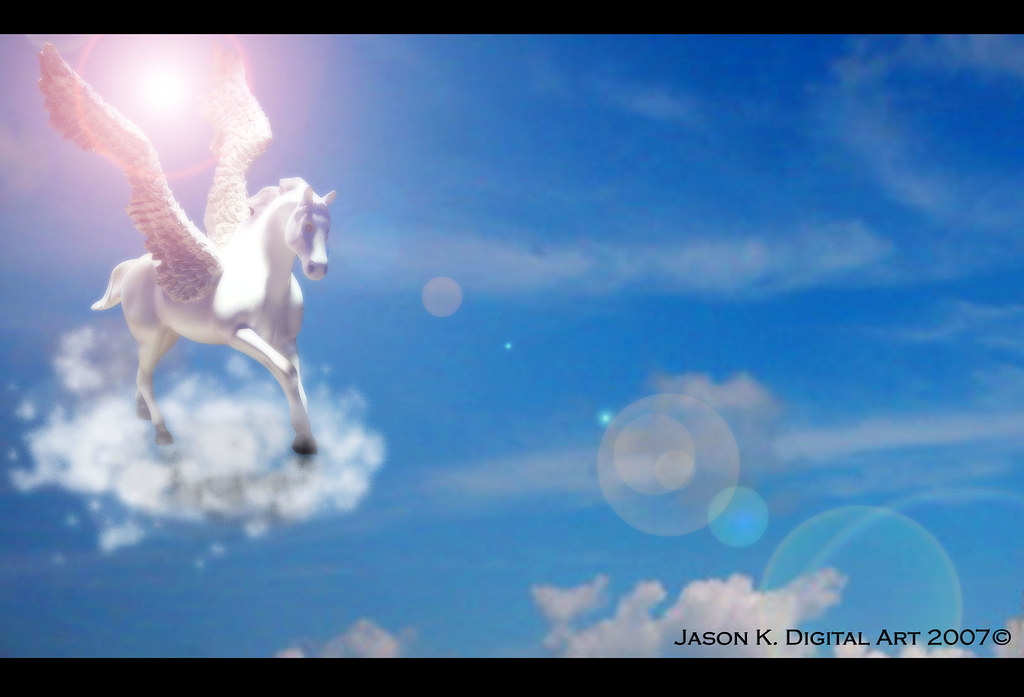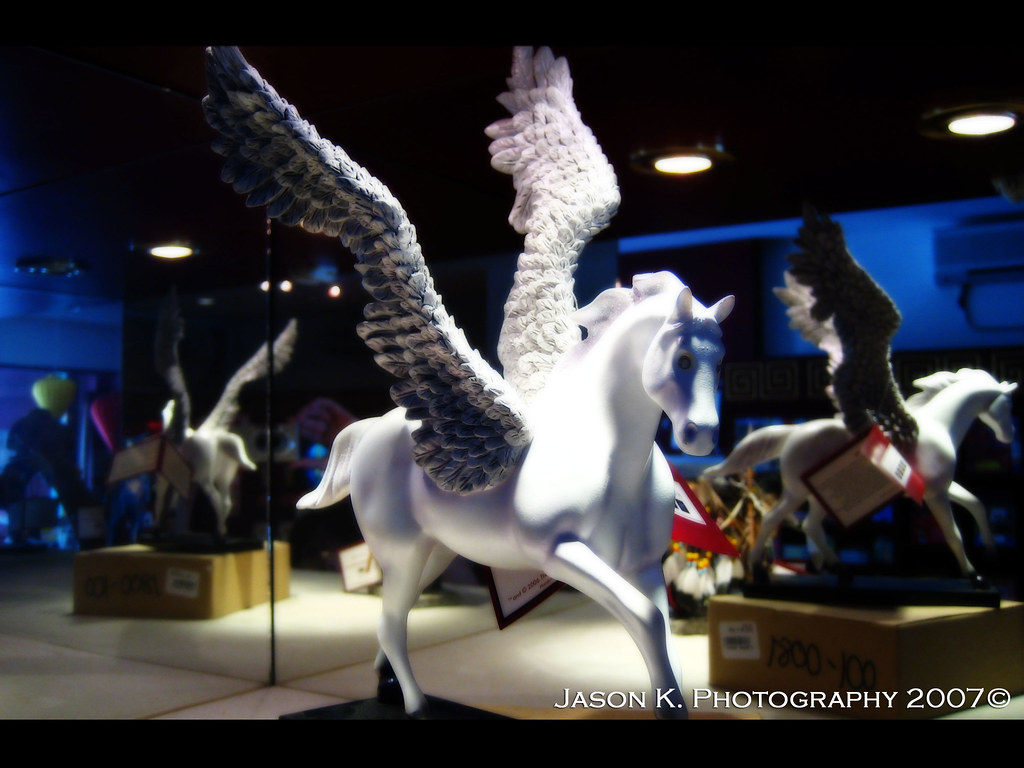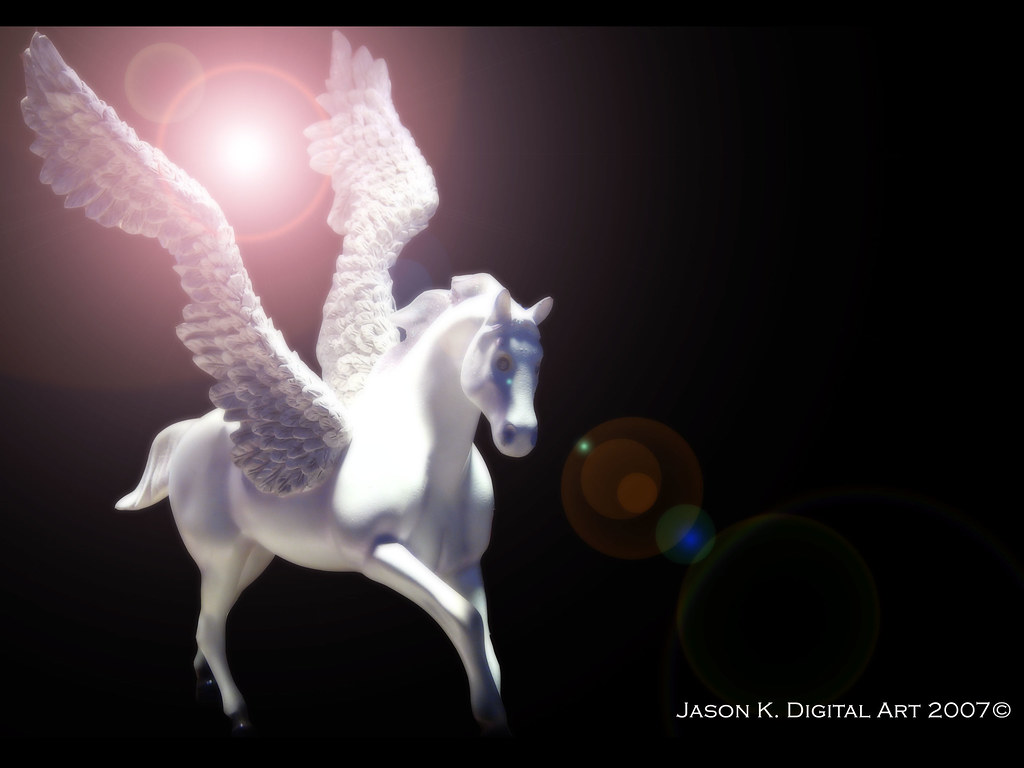
In Greek mythology, Pegasus (Greek: Πήγασος (Pégasos)) was a winged horse that was the son of Poseidon, in his role as horse-god, and the Gorgon Medusa. There are two versions of the winged stallion's birth and his brother the giant, Chrysaor:
* One is that they sprang from Medusa's neck as Perseus beheaded her, a "higher" birth, like the birth of Athena from the head of Zeus.
* Another says that they were born of the Earth as Medusa's blood spilled onto it, in which case Poseidon would not be their sire. A variation on this story holds that they were formed from the mingling of Medusa's blood and the sea foam, thus including Poseidon in their making.
Athena caught and tamed Pegasus, and presented him to the Muses at Mount Parnassus. After he became the horse of the Muses, he was at the service of the poets.
Hesiod connects the name Pegasos with the word for "spring, well", pg; everywhere the winged horse struck hoof to the earth, an inspiring spring burst forth: one on the Muses' Mount Helicon, the Hippocrene ("horse spring"), at the behest of Poseidon to prevent the mountain swelling too much and another at Troezen. The actual etymology of the name is most likely from Luwian pihassas "lightning", or pihassasas, a weather god (the god of lightning). In Hesiod, Pegasos is still associated with this original significance by carrying the thunderbolts for Zeus.
 Pegasus aided the hero Bellerophon (or in later versions Perseus) in his fight against both the Chimera and the Amazons. There are varying tales as to how Bellerophon found Pegasus; the most common says that the hero was told by Polyeidos to sleep in the temple of Athena, where the goddess visited him in the night and presented him with a golden bridle. The next morning, still clutching the bridle, he found Pegasus drinking at the Pierian spring. When the steed saw the bridle, he approached Bellerophon and allowed him to ride. Bellerophon slew the Chimaera on Pegasus' back, and then tried to ride the winged horse to the top of Mount Olympus to see the gods. However, Zeus sent down a gadfly to sting Pegasus, causing Bellerophon to fall all the way back to Earth on the Plain of Aleion ("Wandering"), where he lived out his life in misery as a blinded cripple.
Pegasus aided the hero Bellerophon (or in later versions Perseus) in his fight against both the Chimera and the Amazons. There are varying tales as to how Bellerophon found Pegasus; the most common says that the hero was told by Polyeidos to sleep in the temple of Athena, where the goddess visited him in the night and presented him with a golden bridle. The next morning, still clutching the bridle, he found Pegasus drinking at the Pierian spring. When the steed saw the bridle, he approached Bellerophon and allowed him to ride. Bellerophon slew the Chimaera on Pegasus' back, and then tried to ride the winged horse to the top of Mount Olympus to see the gods. However, Zeus sent down a gadfly to sting Pegasus, causing Bellerophon to fall all the way back to Earth on the Plain of Aleion ("Wandering"), where he lived out his life in misery as a blinded cripple.Afterward, Pegasus found sanctuary on the sacred mountain, where he carried Zeus' thunderbolts and was ridden by Eos, the goddess of dawn.

In his later life, Pegasus took a mate, Euippe (or Ocyrrhoe), and had two children Celeris and Melanippe. This family is the origin of the winged horses. Celeris is associated with the constelation Equuleus.
Pegasus was not immortal. Because of his faithful service Zeus honoured him with a constellation. On the last day of his life, when Zeus transformed him into a constellation, a single feather fell to the earth near the city of Tarsus.
In modern terminology, the word "pegasus" (plural "pegasusses" or "pegasi") has come to refer to any winged horse, though the term "pterippus" (meaning winged horse, plural "pterippi") is also used.



